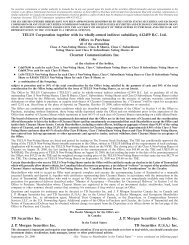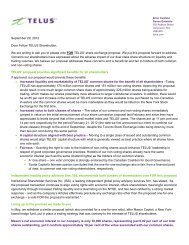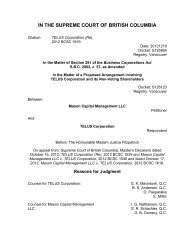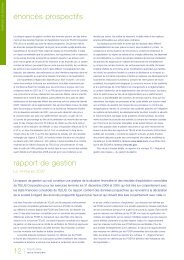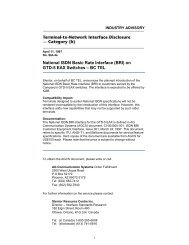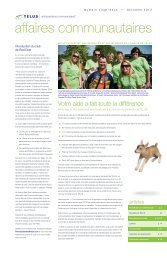Annual report - About TELUS
Annual report - About TELUS
Annual report - About TELUS
You also want an ePaper? Increase the reach of your titles
YUMPU automatically turns print PDFs into web optimized ePapers that Google loves.
management discussion and analysis<br />
Wireline Internet Access<br />
While residential dial-up Internet access competition and<br />
growth is moderate, the battle for residential high-speed<br />
wireline Internet access remains intense. Cable-TV companies<br />
continued to aggressively gain high-speed customers<br />
in 2000, but encountered serious system problems in the<br />
second half of the year and early in 2001. Telecommunications<br />
companies began to close the market share gap by<br />
extending their high-speed coverage and accelerated subscriber<br />
sign ups, which is likely to continue in 2001.<br />
However, <strong>TELUS</strong> has been constrained in its provisioning<br />
ability to satisfy demand for high-speed Internet service.<br />
Also, telecommunications companies cannot offer highspeed<br />
service to all of their service territory due to the<br />
distance and condition of the lines extending from central<br />
offices out to customer locations. As a result, <strong>TELUS</strong> risks<br />
losing market share to cable-TV companies.<br />
Voice over Internet Protocol (VoIP)<br />
A new developing service that may start to negatively<br />
impact <strong>TELUS</strong>’ local and long distance business over<br />
the next few years is Internet telephony, called VoIP.<br />
Although, VoIP has been a technology in progress for<br />
several years, in December 2000 it became available<br />
nationwide for the first time through a provider offering<br />
unlimited North American long distance and 56 kbps<br />
Internet access starting at a monthly rate of $19.95. In<br />
addition, new cable-TV modems are expected to allow<br />
cable-TV companies to begin offering VoIP over their<br />
networks in the next few years. Although <strong>TELUS</strong> is<br />
working on similar technology there can be no assurance<br />
that it will be developed successfully or that the adoption<br />
of VoIP services in the market will not erode the existing<br />
market share of <strong>TELUS</strong> or adversely affect future revenue<br />
and profitability.<br />
> 56<br />
Economic Fluctuations<br />
Economic Fluctuations may adversely impact <strong>TELUS</strong><br />
In recent months there have been increasing indications<br />
that North American economic growth is slowing. For<br />
example, there have been employee layoffs in certain<br />
sectors of the Canadian economy such as the auto sector<br />
and supply of telecommunication infrastructure.<br />
Monetary authorities have moved to lower interest rates<br />
in early 2001 to stimulate the economy and federal and<br />
provincial tax rates are expected to be reduced in 2001,<br />
but the effect of these moves, if successful, can take<br />
several quarters to stimulate the economy. As a result,<br />
residential and business telecommunications customers<br />
may delay new service purchases, reduce volumes of<br />
use and/or discontinue use of services.<br />
Financing and Debt Requirements<br />
The large increase in short-term debt in 2000 at <strong>TELUS</strong><br />
increases the risk that business plans, growth and dividends<br />
could be negatively affected, if new financing is not obtained<br />
or sales are not completed<br />
The purchase of Clearnet and QuébecTel in 2000 caused<br />
an almost four-fold increase in net debt at <strong>TELUS</strong> to $8.0<br />
billion. This was accomplished with a $6.25 billion bank<br />
syndication based on obtaining investment grade debt ratings<br />
in both Canada and the U.S. The debt outstanding at<br />
the 2000 year-end included $5.1 billion due within one year<br />
and $545 million denominated in U.S. dollars, which is fully<br />
hedged against foreign exchange fluctuations. <strong>TELUS</strong><br />
requires a major refinancing in 2001 to lengthen and vary<br />
the maturity of its debt, if possible, to reduce exposure to<br />
short-term interest rate movements and maintain a fully<br />
hedged position against foreign exchange fluctuation risk.<br />
This “Financing Plan” is detailed on page 50.<br />
<strong>TELUS</strong> has announced its intention to sell approximately<br />
$1 billion of non-core or mature assets to help<br />
fund growth and reduce debt levels. In late 2000 and<br />
early 2001, <strong>TELUS</strong> sold three office towers and other real<br />
estate for total proceeds of $205 million, announced an<br />
intention to divest the directory advertising business and<br />
is exploring the sale of its leasing subsidiary.<br />
There can be no assurance that financial market conditions<br />
and debt ratings will remain stable or that <strong>TELUS</strong><br />
will be successful in executing its financing plan, or that it<br />
will be able to do so at rates, terms and conditions that<br />
are reasonable. There can be no assurance that it will be<br />
able to sell additional assets or do so at reasonable



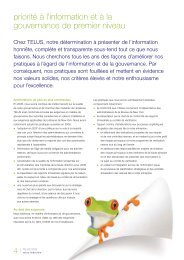
![DISK004:[98CLG6.98CLG3726]BA3726A.;28 - About TELUS](https://img.yumpu.com/16786670/1/190x245/disk00498clg698clg3726ba3726a28-about-telus.jpg?quality=85)
